But while there have been some hairy moments over the years, McConnell’s Fine Ice Creams has managed to stay in the game and maintain slow but steady growth by focusing on what it does best: making decadent, high butterfat dairy ice cream with signature flavors from Eureka Lemon and Marionberries, to Turkish Coffee, and the lowest overrun (air) in the business.
“All of our closest competitors on a national and even regional level are all private equity owned, so they're effectively in the market share business,” observes CEO Michael Palmer, a winemaker who acquired McConnell’s in 2012 with his wife Chef Eva Ein when it was on the verge of bankruptcy, and now supplies a couple of thousand grocery stores as well as its own scoop shops in southern California.
“We're family owned - the only one that I know that still is - so we're effectively in the ‘We better be profitable’ business.”
On the one hand, he says, knowing you can’t throw money around like there’s no tomorrow “makes us very rigorous.” On the other hand, however, it can sometimes feel a bit like “the deck is stacked against you,” he adds. “They're gobbling up market share because their intention is to sell that brand in three to five years, whereas we’re trying to make a profit and be a real business [for the long term].”
High butterfat, low overrun, differentiated flavors...
While small fry compared to some of the players in a category dominated by multinationals (Unilever, Nestlé et al) McConnell’s is a complex vertically integrated business, which makes all of its own ice cream (and co-packs for some other brands) from a factory in Oxnard supplying grocery stores and restaurants, but also owns and operates six scoop shops and runs an e-commerce business.
“We’re not just a brand focused on marketing and branding.”
While self-manufacturing had some advantages during the pandemic (when many smaller brands found themselves squeezed out by- co-packers prioritizing larger clients) and means the company has far greater control, keeping so many plates spinning at one time isn’t always great for the blood pressure, says Palmer, gesturing at his greying hear after almost a decade in the business.
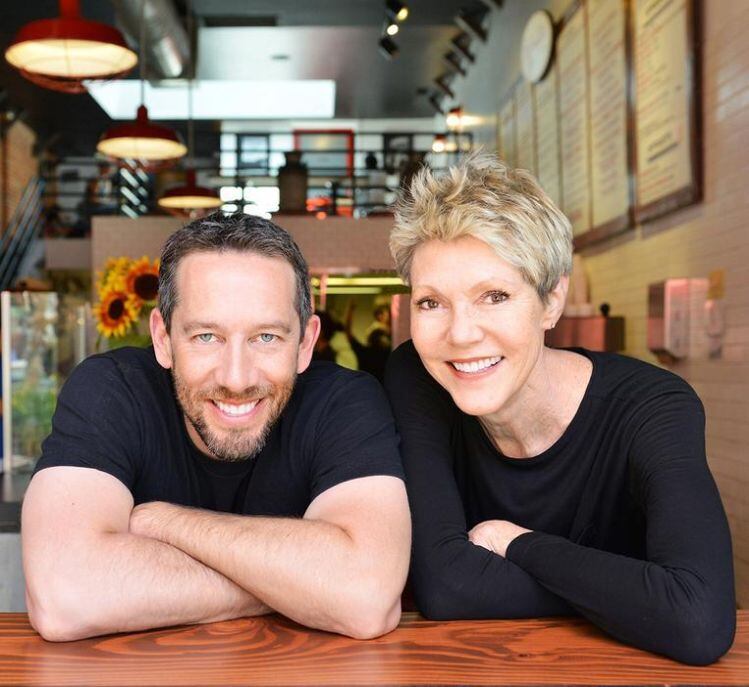
COVID-19: A double edged sword?
When COVID-19 hit, it was something of a double-edged sword for McConnell’s, says Palmer, with business to the restaurant trade and the scoop shops falling off a cliff, while the grocery business picked up as Americans stayed home and did what they do best: splurge on comfort food.
“We closed down a week before anyone else did around the 11th of March 2020 and then slowly began to re-emerge following all the protocols and so on, but the employment issues of late have been incredibly challenging, and it remains a challenge. Our numbers are not close to where they were prior, but things are looking much better.”
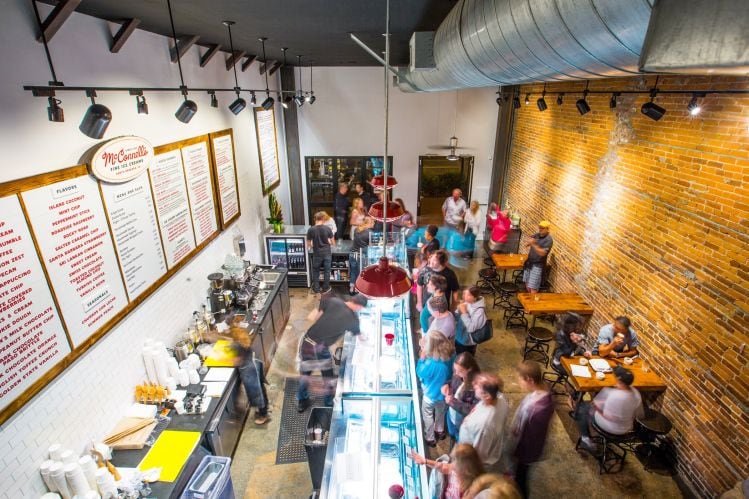
E-commerce: Now a profit center
McConnell’s e-commerce business, however, has gained traction, says Palmer, noting that while the economics of running a direct-to-consumer ice cream business are challenging – ice cream is bulky, weighty, and must be kept frozen throughout the supply chain - the pandemic has accelerated adoption of food e-commerce as Americans stay in and enjoy affordable luxuries such as chocolate and ice cream instead of traveling and eating out.
“Over the past several years, we looked at it more as marketing than as a profit center, but now it's genuinely become a profit center.”
‘We’ve grown every year…’
Delving deeper into the grocery retail business, he says: “We’ve grown every year, even though the overall ice cream category has been fairly flat until covid hit, as we’re in a subcategory [premium regional ice cream] that has continued to grow, because I think in general, having a higher quality product, people have shown a preference for that.
“We had a bit of a bump during covid that was healthy enough to keep us in business, when our scoop shops were under such duress.”
While all bets are off when it comes to COVID-19, he says, running your own retail outlets (scoop shops) can make money, provided they are well run and you have good, high-traffic locations, plus they provide a valuable testing ground for new flavors and products that can then be pitched to grocery retailers, and they're great for branding and marketing purposes.
However, “the origination costs of a store are sizable,” he says, and while McConnell’s wants to grow, it doesn’t have the capital to buy up scores of locations and build a scoop shop empire overnight.
“We continue to open stores opportunistically where we think we can find a great location, and it helps the brand, but it's not our plan to manage a 50-chain group of stores; we want to take our business in other directions.”
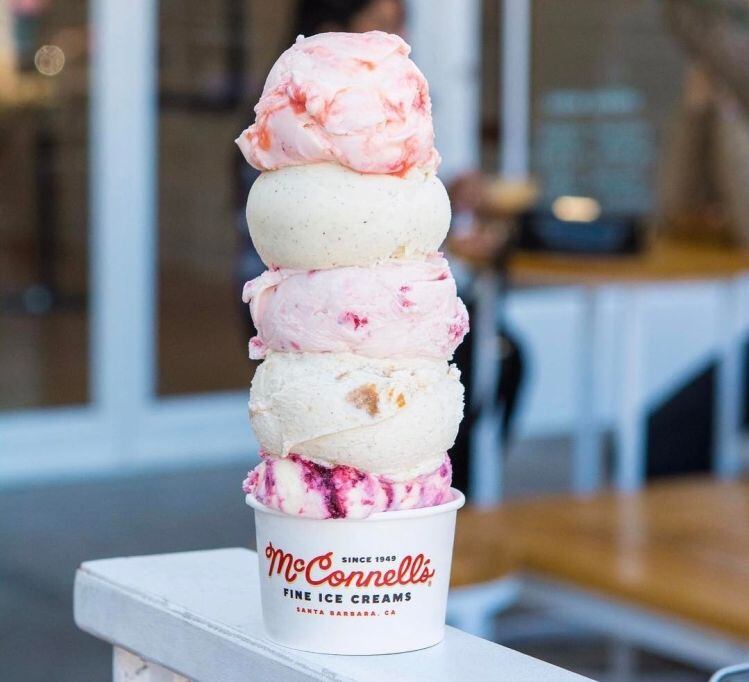
Understand your brand
Although much of the growth in the category has lately come from ‘light’ ice cream products that have fewer than 300 calories per pint, deploying a raft of alternatives sweeteners and fats, a lot of overrun (air) and a long list of ingredients you won’t find in Grandma’s kitchen, developing a Halo Top ripoff wouldn’t really make sense for McConnell’s, says Palmer.
“We experiment with flavors via limited editions – we’re run by a Chef (Palmer’s wife), and we’re definitely a brand run by ‘foodies,’ – but if there's one thing we pride ourselves on, it’s making the most indulgent, creamy, dense, ice cream of the highest quality. So you see brands like Halo Top where there's this incredible spike for a time due to a trend, but that wanes.
“We’ll likely never have astronomic or ballistic growth like that,” he says, but McConnell’s hasn’t lasted for 70 years without understanding what makes its brand resonate with consumers: “Our goal is to continue to grow steadily over time.”
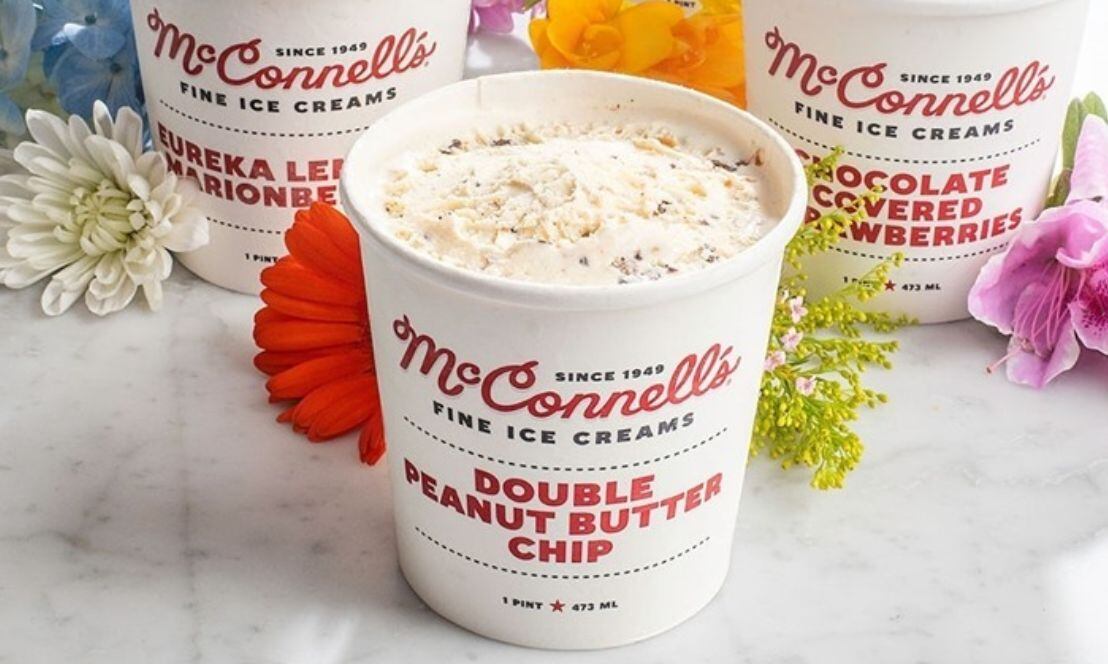
Finer ingredients, more interesting flavor profiles
As for price, meanwhile, small brands such as McConnell’s - which is typically priced at around $8 off promotion - are never going to compete with Häagen-Dazs or Ben and Jerry's, but they’re not really in the same space anymore, says Palmer.
“Really, those products are trading at the tail end of their brand lifecycle. They’re in every store in America, and they're trading on volume and price.”
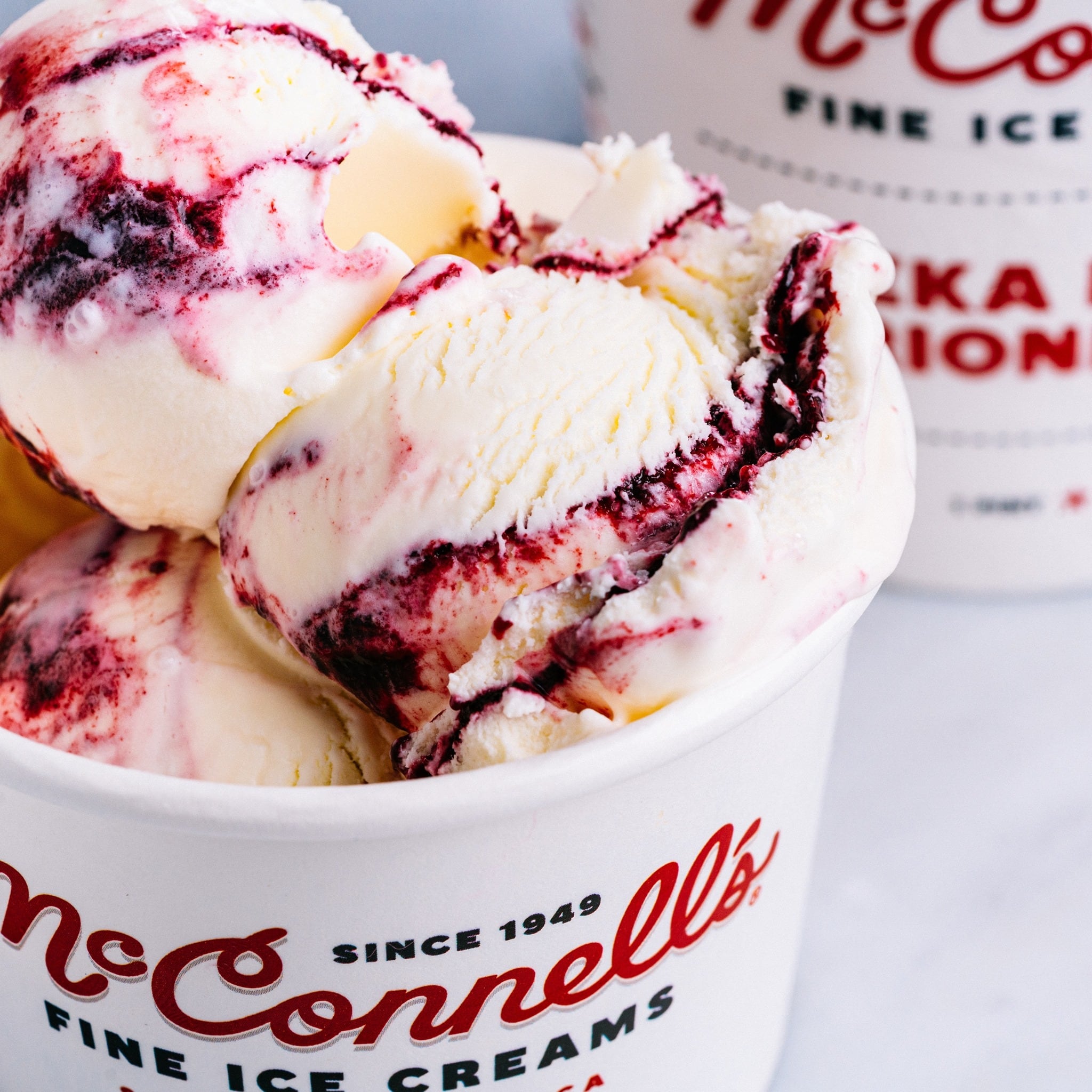
And while the McConnell’s brand has actually been around longer than Häagen-Dazs (founded in the early ‘60s) or Ben and Jerry's (late ‘70s), its mission - “to reinvent this category with finer ingredients and more interesting flavor profiles" is one that resonates with today's consumers.
Spoiler alert: ‘We’re not going to bring out a bone marrow and sugar snap flavor…’
When it comes to ice cream flavors, he says, while it’s fun to come up with culinary-inspired flavors that may work well in a restaurant or a scoop shop, most grocery retail buyers are probably not going to go weak at the knees when presented with a lavender, basil and sweet potato masterwork, so the secret is finding something sufficiently distinctive, that also has a familiar note.
“We look at what’s happening in the world of food and what’s interesting, but we’re not going to bring out a bone marrow and sugar snap flavor, we’re looking for full flavor and a balanced product.
“The fact we are higher-than average in butterfat (up to 18%+) also helps, as butterfat is a great delivery system for flavor," says Palmer. "But in a grocery retailer, the pint buyer is typically going to give you seven [SKUs] at most, and you’re generally looking at a more conservative buyer than someone in a scoop shop that’s going to take a chance on something new.”
He adds: “There has to be something both differentiated and recognizable, and it took us a few years to really understand what that means.”
Dairy-free reinvention: ‘I put my tail between my legs and we went back to the drawing board’
So what’s new at McConnell’s?
The latest innovation under the McConnell’s brand is a re-formulated dairy-free line coming out next month, says Palmer.
“We released our first dairy free collection about three and a half years ago. At the time, it was the first pea protein-based product in the category because we really thought people wanted something very different and we didn’t want everything to taste of coconut [the most popular base for dairy-free products].”
The end result, he acknowledges, was certainly different, but it didn’t set the world on fire. “I put my tail between my legs and we went back to the drawing board and developed a new base of oatmilk, refined coconut oil and cocoa butter that is very close to the fat content of our dairy ice cream that should get in the resets in 2022.”
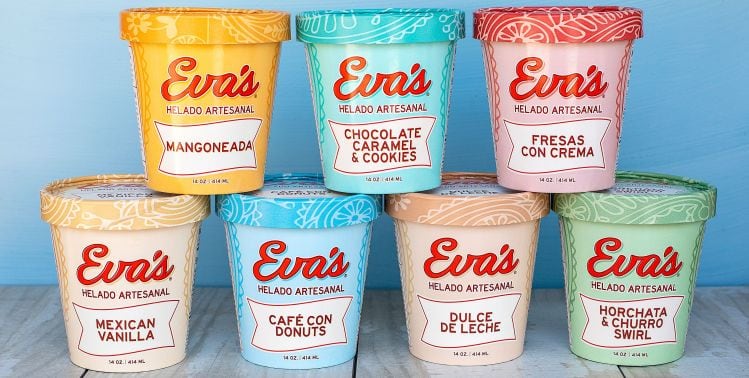
Eva’s Helado Artesanal
The second innovation – which recently hit stores on the east coast – is under a new sub-brand called Eva’s Helado Artesanal that celebrates Latin American cuisine and flavors and is at a slightly lower price point.
“Over the years we’ve made a series of ice creams inspired by these regional and ethnic flavors, and we wanted to really lean into that with a new brand, because the McConnell's brand, which is certainly for foodies, is more of a heritage brand from mid-century America, very nostalgic. This is something different.”
The seven-strong Eva's range – which includes flavors such as Fresas con crema; horchata and churro swirl; and Mexican vanilla - is “all about our hometown and Oxnard and Central California where there's a large population of Latin X consumers," says Palmer. "But we see this as a platform to go in a whole bunch of different directions with multiculturalism and global food.
“We’re also looking at other products, whether they're Asian or Middle Eastern to really have fun with different flavor profiles.”
*The ice cream images in the video are courtesy of McConnell’s Fine Ice Creams
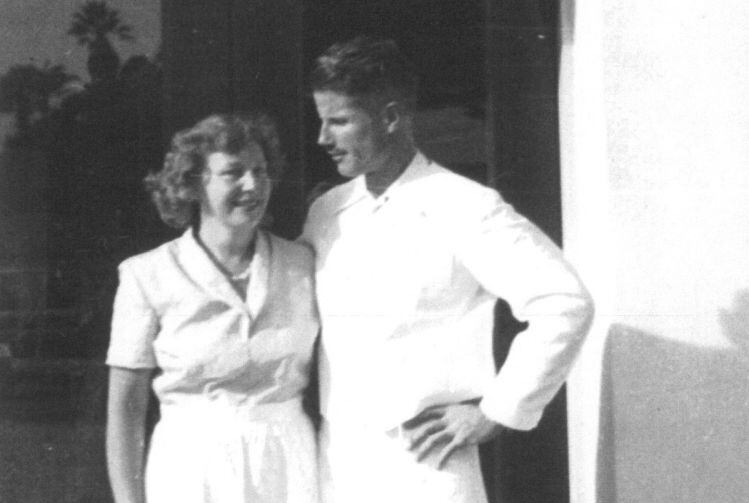
Founded in 1949 by World War II pilot Gordon ‘Mac’ McConnell and his wife Ernesteen (‘Ernie’), a schoolteacher, McConnell’s is a local institution in Santa Barbara, California, where you’ll see scores of locals and tourists queuing outside its scoop shops on State Street to sample flavors from its signature Eureka Lemon and Marionberries, Sweet Cream, and Turkish Coffee, to Honey and Cornbread Cookies.
At a time when food manufacturing was all about bigger, faster, better – which in ice cream meant batch freezing, stabilizers, a lot of air, and a ton of sugar – Mac and Ernie (picture left) developed a mechanized version of the European French Pot ice cream-making process, which deploys a slower churning process that delivers a denser product.
After Mac’s death, Ernie sold the business in the early 1960s to a local businessman called Jim McCoy, who purchased the Old Dairy in Santa Barbara. In the mid ‘70s, McCoy sold the company’s dairy farming business to focus exclusively on manufacturing McConnell’s ice cream.
By 2012, the company was “headed towards bankruptcy,” says CEO Michael Palmer, a winemaker who stepped in with his wife Chef Eva Ein to acquire the business. Today, McConnell's operates six company-owned scoop shops in Santa Barbara, San Luis Obispo, and Los Angeles; supplies some restaurants and around 2,000 grocery stores including Ralph’s, Whole Foods, Albertsons, Mariano’s, Central Market, and Target; and operates a small but growing e-commerce business.
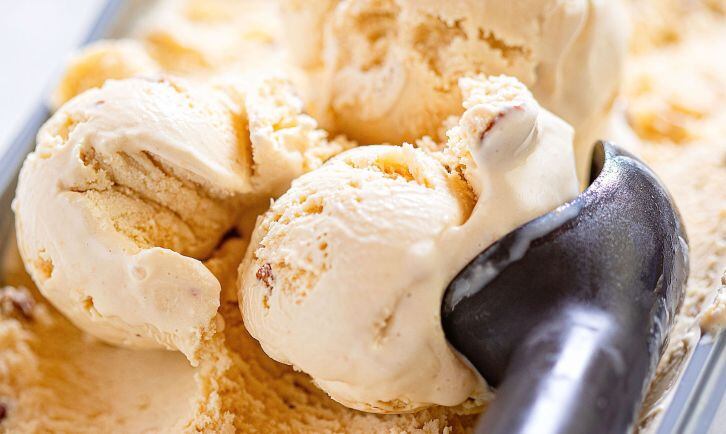
"[Co-founder] Gordon [McConnell] designed a modification of the French pot process back in the 40s," says McConnell's CEO Michael Palmer, a branding expert and winemaker by trade who quickly learned a lot about ice cream production after acquiring Santa Barbara-based institution McConnell's in 2012.
"The standard batch freezing process for ice cream production is essentially a Slurpee machine meets a freezer," says Palmer. Following blending, pasteurization, homogenization, and ageing, the mix is pumped through a barrel-like freezer with rotating blades that keep the ice scraped off the surface of the freezer, and dashers that whip the mix and incorporate air, often at around 50%.
The problem with this, says Palmer, who says McConnell's overrun is "far lower than that and of any brand I know," is that "dairy is very delicate and if you are whipping it, you’re whipping in a lot of air, but you're also beating the living heck out of the product. Gordon invented a process that, geared a batch down to very slowly churn it to not incorporate all that air.
"Where we differ now is that we use a continuous process that slaved to software so we can dial in things like overrun and things of that ilk, and get an incredibly consistent product."
Today, McConnell's manufactures its ice cream - and all of its inclusions - inhouse in a state of the art production facility in Oxnard, 'The New Dairy,' which opened in 2019, says Palmer.
"The Old Dairy [in Santa Barbara] was not built for what we were asking of it, so we had to make a decision in around 2017. Do we carry on making ice cream ourselves or go with a co-packer?
"And for better or for worse - and on any given day I could go either way - we decided that part of what makes us special is the fact that we make our own products. So we built a state of the art dairy plant with a full scale commercial kitchen where our pastry chef makes everything that goes into the products as well."
